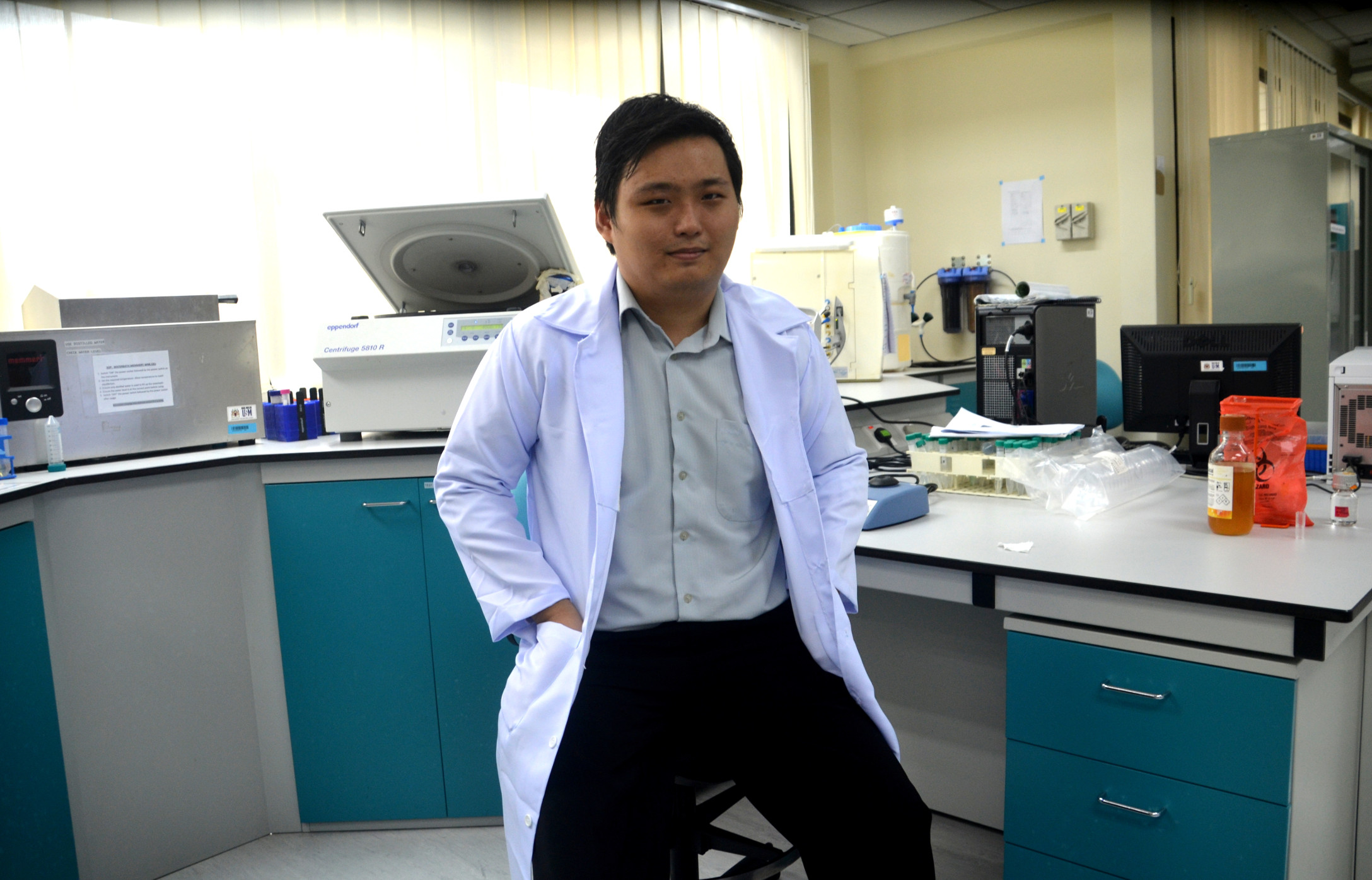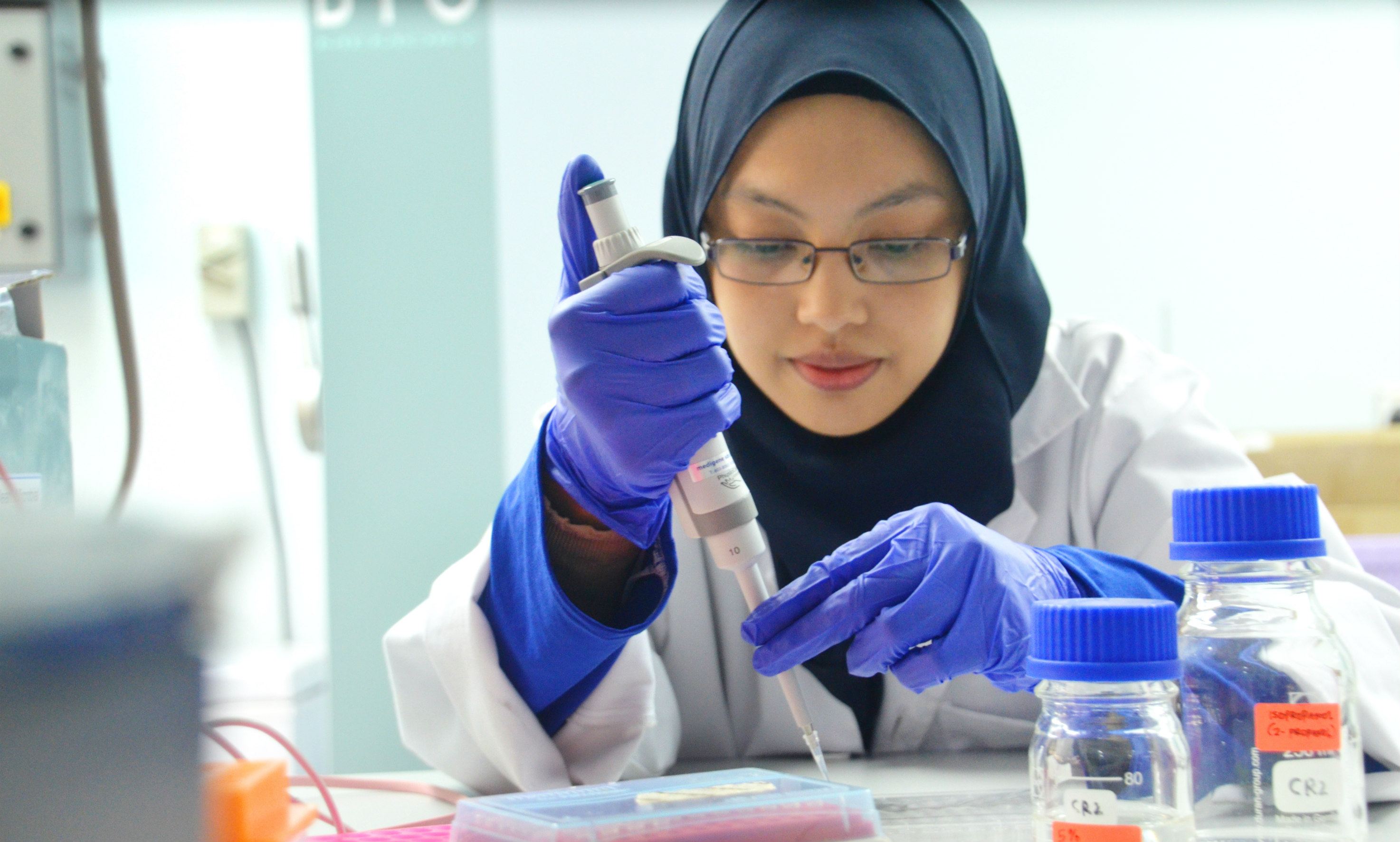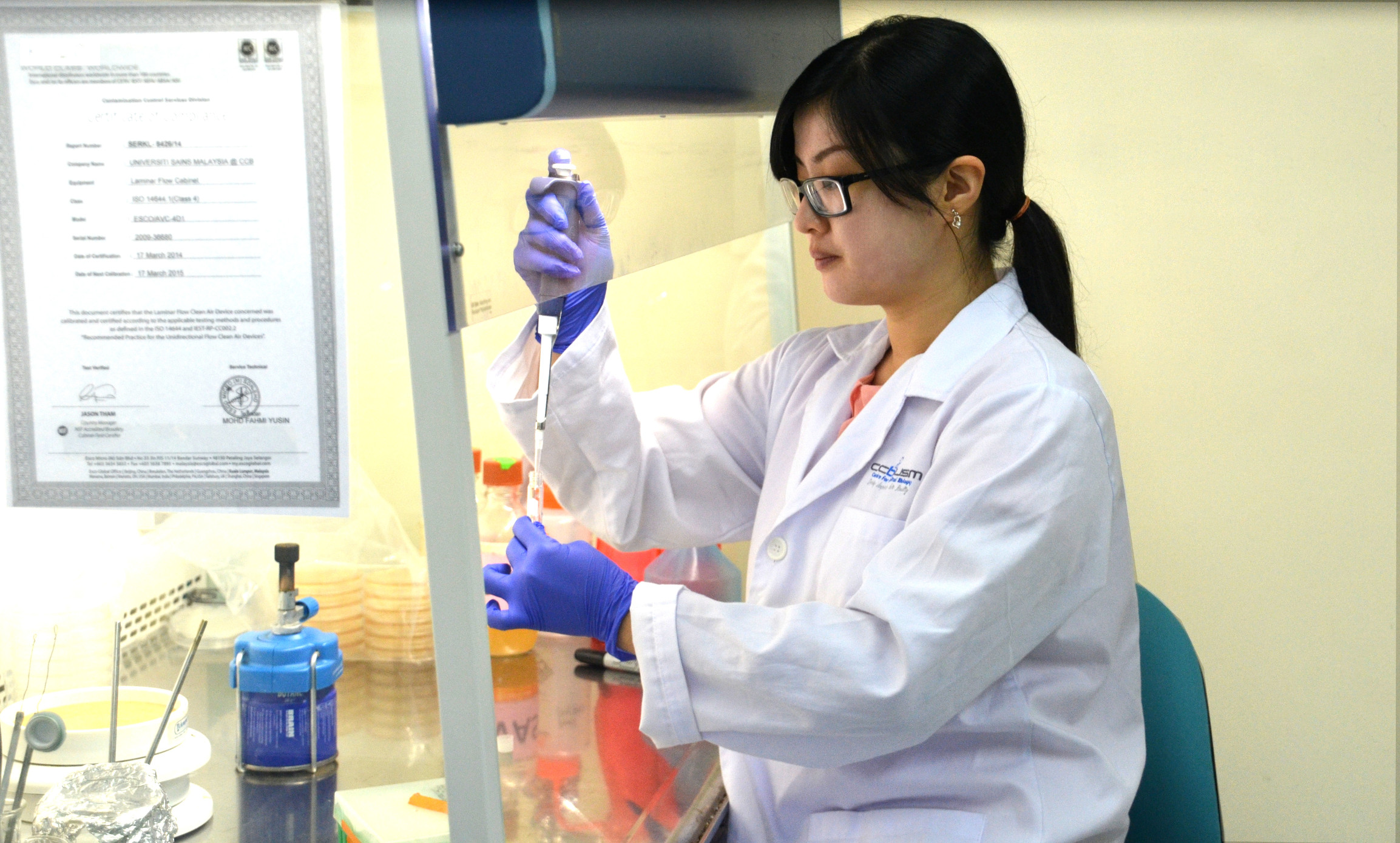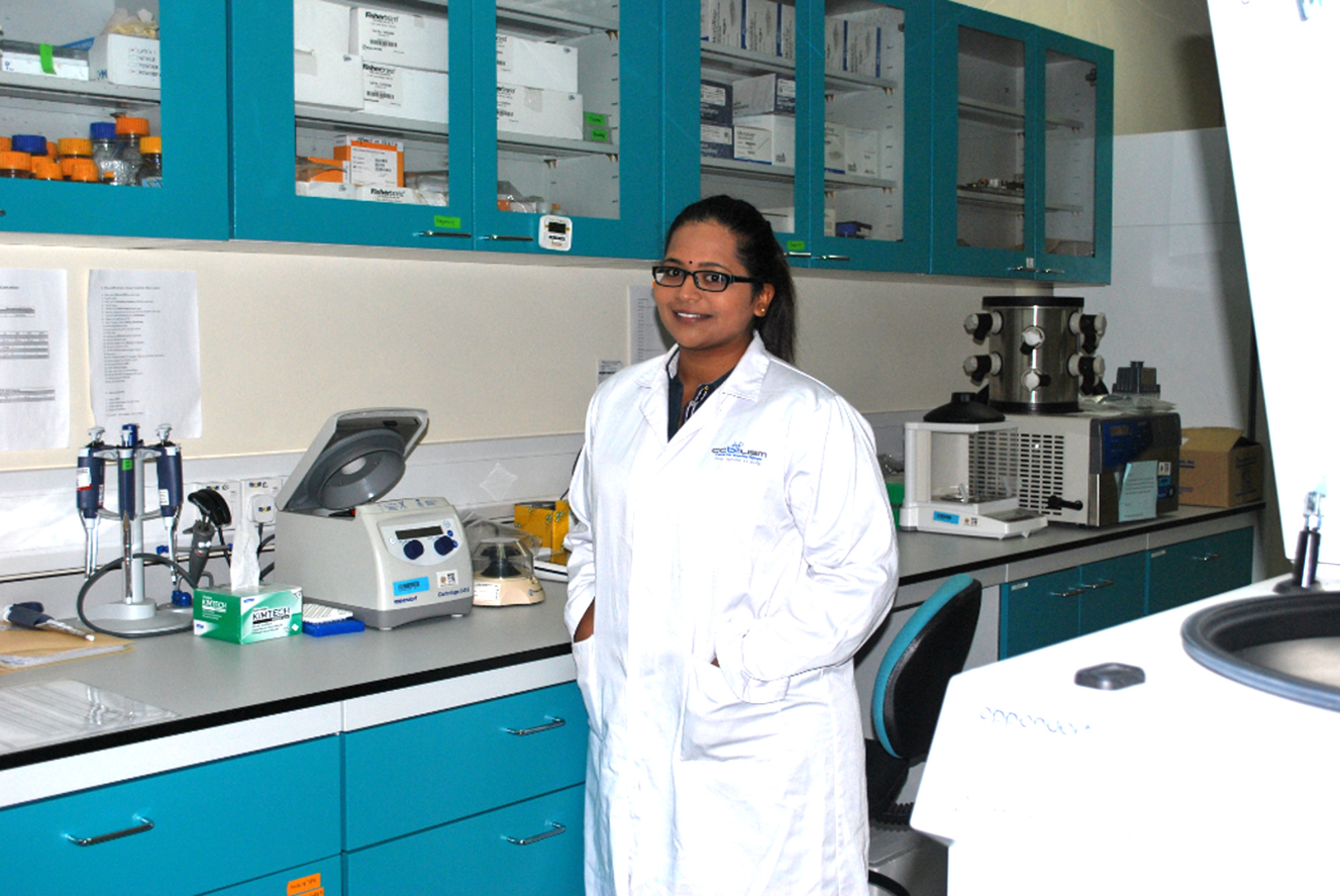{slider-nested MOH TSU HORNG}
Tell us a bit more about yourself
Hi, my name is Tsu Horng and I am from Penang. I did my undergraduate in School of Biological Sciences, USM, majoring in biotechnology. Currently, I am a master student in CCB under supervision of Prof. Dr. Alexander Chong Shu Chien.
Describe your research at CCB in layman terms
We had isolated a bacterial strain from Matang Mangrove Forest and based on preliminary test, we believe that it is a new species of genus Microbulbifer. My research includes complete genome sequencing and analysis as well as identification and characterization of the bacterium.
Why dedicate extra years of your life for postgraduate research?
In my earlier years, I am fascinated by genetic engineering and what it is capable of. This is the main reason why I had chosen biotechnology as my major during my undergraduate studies. I never felt enough of what I have learned during my undergraduate studies and therefore I continue my studies as a master student in CCB.
Share with us your experience as a student, in CCB
While most people appreciate the state-of-the-art research facilities provided by CCB, my best experience here in CCB is with the people here. Everyone in CCB is very friendly and helpful as they always happy to help and share their experiences whenever I have problems during my research. Last but not least, I can’t be more grateful for the support and guidance given by my supervisor, Prof Alex and my mentors, Dr. Lau and Dr. Go.
{slider-nested FARIZAH HANIM BT LAT}
Tell us a bit more about yourself
Hello, I’m Hanim. I was born in Penang but raised in Sungai Petani, Kedah. I did my undergraduate studies in Microbiology at Universiti Sains Malaysia. I’m an MSc student here in CCB, under the supervision of Prof. Amirul Al-Ashraf Abdullah with the co-supervision of Dr. Melati Khairuddean.
Describe your research at CCB in layman terms
My research is focused on new natural products with antioxidant and antibacterial properties produced by Streptomyces sp., which was found in unexplored mangrove sand. Although many scientific studies focus on medicinal plants, vegetables and fruits, I chose to study on products from endophytic sources. This will produce new discoveries in pharmaceutical and therapeutic fields.
Why dedicate extra years of your life for postgraduate research?
Postgraduate research added to my store of experience, knowledge, skills and confidence needed to become a good researcher and to face the challenges of the outside world. Personally, I became more knowledgeable in the field of microbiology, thus giving me the chance to expand my potential and develop a positive attitude toward my future career.
Share with us your experience as a student, in CCB
I got to meet so many interesting people and am honoured to know them, learn from them, and work with them at the same time. I am honoured to be one of CCB’s students. Thanks to CCB for providing great facilities such as lab instruments, chemicals and work space for everyone to complete their research. I would like to say thank you to my mentors (Prof. Amirul, Dr. Melati and Dr. Ira), their endless guidance taught me a lot during my Master’s project.
{slider-nested SITI NUR FATIN AHMAD KAMAL}
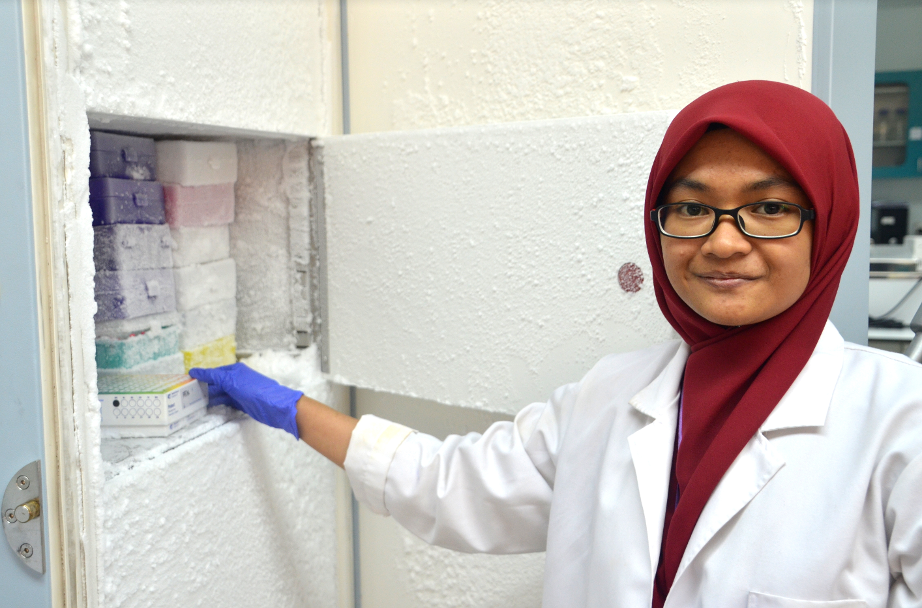
Tell us a bit more about yourself
Hi, I am Fatin, an elder sister of a younger brother. I was born in Jitra, Kedah but currently residing in Kulim, Kedah. I joined CCB since November 2013 as a student pursuing Master of Science after having obtained Bachelor of Science in Biology with honours from USM. My Master's research is supervised by Prof. Amirul with co-supervision of Prof. Alexander and Dr. Melati.
Describe your research at CCB in layman terms
My research is more to the discovery of natural products from marine actinomycetes. I am looking for actinomycetes capable of producing compounds that can protect hosts from being infected by Pseudomonas aeruginosa, which is a common pathogen that causes a hard-to-be-treated infection in humans. The host used in this research is the nematode Caenorhabditis elegans. C. elegans is easier to handle and at the same time, it provides many insights into the underlying mechanisms of human diseases as well as the drug efficacy within the context of a whole organism. The extracts from the isolates were tested on C. elegans infected with P. aeruginosa to study whether the extracts improve host survivability by diminishing the virulence factor of the pathogen or by modulating the immunity of the host.
Consequently, this study allows the exploration of a potential novel therapeutic compound from a less explored environment - the marine ecosystem. The potential of an organism is not known until we test it because every single thing has never been created to be wasted.
Why dedicate extra years of your life for postgraduate research?
Pursuing study in postgraduate research is not only about gaining more knowledge. It teaches me to be a better person, to build personality, to think rationally, critically and futuristically, to be confident and to be prepared for any circumstances because there are many possibilities we will encounter in research. It is very challenging yet a rewarding opportunity to build a better self.
Share with us your experience as a student, in CCB
CCB has kindly provided all the needs for research and being a part of CCB is a genuine blessing. Surrounded by amazing people and experts in multiple research fields places CCB on a position as a great transdisciplinary research facility.
{slider-nested SAM KA KEI}
Tell us a bit more about yourself
Hi, I’m Ka Kei, with Microbiology degree from Universiti Sains Malaysia. Presently, I’m a master student in the field of biotechnology at Centre for Chemical Biology, under the supervision of Prof. Dr. Alexander Chong Shu Chien.
Describe your research at CCB in layman terms
My research is focused in genetic engineering of cyanobacterium by heterologous expression of the introduced rubber biosynthesis-related genes from Hevea brasiliensis. Findings from this research will provide valuable insight into the potential of photosynthetic cyanobacterium Synechocystis sp. as suitable platform for sustainable production of polyisoprene in the near future.
Why dedicate extra years of your life for postgraduate research?
Postgraduate research provides us the opportunity to study our chosen topic in more depth and enhance our knowledge. CCB offers the topic of my interest, which is related to molecular work, encouraging me to pursue my postgraduate life. Most importantly, experiences and skills obtained during postgraduate research do help to improve myself.
Share with us your experience as a student, in CCB
As a postgraduate student in CCB, first of all, I would like to say thank you to Centre for Chemical Biology for providing us such a good environment to study and work with all experienced lecturers, postdoctoral fellows, CCB staffs, and students. Most importantly, thanks for having experienced and good mentors (Prof. Alex and Dr. Lau), their endless guidance do let me gained a lot of valuable experiences during my Master project.
{slider-nested PRIYA GUNASELVAM}
Tell us a bit more about yourself
Hello, my name is Priya. I am from Shah Alam, Selangor. I did my undergraduate in Biotechnology at AIMST University. Currently, I’m a MSc student here in CCB, under the supervision of Prof. Dr. Alexander Chong Shu Chien.
Describe your research at CCB in layman terms
My research is focused on the metagenomics of soil microbial communities from Matang Mangrove Forest Reserve (MMFR), Malaysia, which has been acknowledged as the best managed mangrove forest. My study focused on two sampling sites at MMFR with distinct features: the Productive Zone (tree harvesting) and Virgin Jungle Forest (pristine area). This study touches the subject of whether the distinct features of the sampling sites shape the microbiome or genes harboured by these microorganisms.
Why dedicate extra years of your life for postgraduate research?
During the course of my final year project, I started developing a keen interest in scientific research. The problem solving skills that I attained proved that research is the key to answer important biological questions. This prompted me to look for interesting postgraduate opportunities to develop my skills as a researcher. Moreover, I aspire to become an academician and therefore, a postgraduate degree proved inevitable.
Share with us your experience as a student, in CCB
Since my first day in CCB, everyone has been very welcoming. The research facilities especially for bioinformatics have been amazing here and this has allowed me to complete my work in time. Moreover, I cannot thank my mentors (Prof. Alex, Dr. Lau, Dr. Go) enough for their endless support and guidance. CCB has taught me the traits of being a good researcher and I’ll be forever grateful for that.
{slider-nested DINESH BALACHANDRA}
Tell us a bit more about yourself
Hi, I’m Dinesh. I was born and raised in Penang. Attended Penang Free School and later joined AIMST University to pursue my pre-u and Bachelor’s degree. Currently, I’m in CCB under the supervision of Prof. Alexander Chong Shu-Chien to carry out my MSc. research with the help of two postdoctoral fellows.
Describe your research at CCB in layman terms
My research revolves around genome studies, identification and characterization of three Mangrovimonas-like strains that we have isolated from two mangrove forests in Perak, Malaysia (Matang Mangrove Forest and Taman Paya Bakau). The finding of these novel bacterial strains will certainly add scientific knowledge relative to this newly discovered genus in terms of genomic properties and nomenclature.
Why dedicate extra years of your life for postgraduate research?
I feel a postgraduate degree allows us to explore possibilities in terms of scientific research and a career. Postgraduate research also provides invaluable scientific knowledge and transferable skills to be used in academia or the commercial world. It also gives me the opportunity to develop into a more mature person, capable of dealing with the uncertainty and the ups and downs of research.
Share with us your experience as a student, in CCB
To be honest, I found my true calling for research after joining CCB. Through the guidance of my mentors (Dr.Go & Dr. Lau) and my supervisor, Prof. Alex, I have truly understood the underlying essence of research and what it takes to be a researcher. My mentors and supervisor have always been accessible and friendly. Moreover, they have always invested time to guide my research in the right direction. Everybody in CCB has treated me as a friend since my first day here and the lab facilities here have truly facilitated the smooth progression of my postgraduate research.
{slider-nested JESS LOH SWEE CHENG}

Tell us a bit more about yourself
I am Jess, a PhD student under supervision of Prof. Dr. Alexander Chong Shu Chien. I did my undergraduate and MSc in School of Biological Sciences, Penang, USM. Recently, I am glad to have my younger sister joining CCB as a research assistant.
Describe your research at CCB in layman terms
My research at CCB is to study the gene expression pro files in the induced secondary laticifers bark samples of rubber tree, Hevea brasiliensis. Laticifer is a latex-containing cell and the number of laticifers plays a vital role in affecting latex yield. With a better understanding the genes involving in secondary laticifer differentiation, our study provides a strong platform for the future research and breeding of H. brasiliensis clones with increased number of laticifers that in turn improving the latex yield.
Why dedicate extra years of your life for postgraduate research?
I dedicate extra years of my life for research as it is good for self-improvement in the aspect of thinking, reading, and writing. Also, doing research can unravel knowledge that in turn contributes to the academic and even the commercial world.
Share with us your experience as a student, in CCB
I started my PhD study in September 2013. I like CCB@USM very much as it is a very clean and well equipped place for research work. In CCB@USM, I have the opportunity to meet helpful, friendly, and intellectual people. I am pleased to have my mentors (Prof. Alex, Dr. Gincy and Dr. Lau) giving me invaluable advice and guidance throughout my study; helpful admin staffs and interesting colleagues in CCB@USM. Besides study, I involved in organising the bioinformatics workshop with other CCBians. To date, I have participated 2 bioinformatics workshops, both was held in the computer hub in School of Biological Sciences, USM. It was a great experience meeting speakers from different countries throughout the workshops. Thanks to all CCBians and people I have met in CCB@USM that shaped me into a better researcher and more importantly a better person.
{slider-nested MUHD KHAIRUL LUQMAN BIN MUHD SAKAFF}
Tell us a bit more about yourself
I was born in Sitiawan, Perak in 1985. My father is a retired Malaysian navy officer while my mother is a school teacher. I am the eldest out of 4 siblings. I just got married recently; my wife is currently pursuing her MSc at USM.
I did my undergraduate in Biomedicine at the School of Health Sciences, USM. Later, I pursued my MSc in Microbiology (on thermophilic bacterial genome) at CCB@USM. Currently, I am a PhD student at CCB@USM under the supervision of Associate Professor Ahmad Sofiman Othman.
Describe your research at CCB in layman terms
Upon collecting the fungal samples from the infected rubber trees, we extracted the genomic DNA. We then proceed to sequence, assemble and analyze the genomic DNA by using the next generation sequencing technology. Knowledge gained from this study will help to further our understanding of the fungus; their lifecycle, the whole repertoire of proteins it could synthesize, the infection mechanism used to infect the trees, and also uncover potential loop holes that we could exploit to manage the fungus.
Why dedicate extra years of your life for postgraduate research?
I like studying something unknown especially the ones related to disease. It is my passion to understand how an organism that causes disease invade, hijack and manipulate the host to do its bidding. It is like studying how a pirate does the hijacking and that is fascinating!
This influences my decision to further my studies as I really wish to go much deeper on the subject of disease mechanism. Choosing the postgraduate research path allowed me to learn and received guidance from experienced mentor and fellow colleagues on conducting the research. Ultimately, I hope to turn out as a capable researcher capable of helping the world with the skills I gained throughout the postgraduate years.
Share with us your experience as a student, in CCB
CCB@USM has been a major part and parcel of my life thus far. I started my journey at CCB@USM in June 2008 and ever since it has been a rewarding journey.
I got to meet so many interesting people, gaining the pleasure of knowing them personally while learning and working together with them at the same time. I am deeply honored to have met them, especially my mentors and colleagues in CCB@USM. I learned so many things here, as a researcher and also as a part of a bigger scientific community.
The staff and lecturers are supportive of the research; the needed equipment is available for use. Essentially, this helps a lot speeding up the research progress.
Looking back at the past, the experience that I had in CCB@USM thus far has shaped me into a better researcher, a refined person, a good team member and importantly a wiser and mature human being. I am thankful for that.
{slider-nested SARANPAL SINGH CHHABRA}
Tell us a bit more about yourself
I am Saranpal, presently a MSc student at CCB@USM under the supervision of Professor Dr. K. Sudesh Kumar and Dr. Teh Aik Hong. I obtained my diploma and undergraduate degree majoring in Biotechnology. Besides research, I also dedicate my time as a part-time biology tutor for secondary school students.
Describe your research at CCB in layman terms
My research at CCB focuses on studying the 3D structure of small rubber particle protein (SRPP) from the rubber tree. This protein is speculated to be involved in the rubber production and it also plays a role as a latex allergen. It is hoped that the information gained from the 3D structure of this protein will be used to genetically improve and increase the rubber yield, as well as to devise strategies to overcome the allergenic reaction caused by the SRPP protein.
Why dedicate extra years of your life for postgraduate research?
Doing research is my passion. My passion for research dates back to when I was pursuing my diploma in Biotechnology. It was during that time I was first introduced to the central dogma of biology in one of the Cellular and Molecular Biology lectures that I attended. “What is Life? How do genes and proteins function within an organism? What is the underlying mechanism that governs the cells to behave in such a manner?” I questioned myself. It was these initial questions within me that led me into this magnetic field of biology. I strongly believe that when you are constantly questioning, you are constantly learning. It is a knowledge-based field where you grow daily. And I think this explains why I chose to embark on my postgraduate research.
Share with us your experience as a student, in CCB
Looking back on the two years that I have spent in CCB@USM, I feel and believe that my research capacity, creative thinking as well as my experimental skills have experienced vast enhancement. I realize that the theoretical knowledge that I seized from the classroom activity and textbooks during my undergraduate studies is often distinct from, and sometimes even unreservedly opposite to, the actual benchwork experiments that I perform. In addition, the state-of-the-art research facilities equipped with cutting-edge technology at CCB@USM enable me to carry out my research efficiently.
{slider-nested TENGKU YASMIN PUTRI TENGKU MOHD YUSOF}
Tell us a bit more about yourself
My name is Yasmin. I am from Kuala Terengganu. I am the third in five siblings. I joined the Structural Biology group at CCB as a PhD student in 2014 under Dr. Teh Aik Hong’s supervision. Previously I completed both my bachelor and master’s studies in Microbiology at a Research University in Selangor.
Describe your research at CCB in layman terms
Basically I am studying two proteins from a foodborne pathogen Salmonella in terms of their structures and functions. The proteins, namely toxin and antitoxin, are very important for bacteria to survive in a harsh environment, such as antibiotics exposure and lack of nutrients. Under a stress condition, the toxin functions to suppress bacterial growth by targeting the essential biological processes. This might at first sound like disadvantageous to the bacteria, but this process is instead very important because the bacteria can enter into a dormant stage where they are presumably dead — they are still alive, but just not active. In a normal condition, meanwhile, the antitoxin will neutralize the toxic effect.
I can make an analogy between bacterial cells and a country. When a country is in a prosperous and harmonious state, its growth and development will be very fast. There are housing construction, a lot of events or festivals and activities. But when the country is exposed to threats such as war, poverty, food shortages or an economic crisis, then there will be a moment when all the unnecessary or nonessential activities have to slow down — slow enough so that everyone can survive on just whatever they have. As for bacteria, they may need to stop their growth, slow down their protein production and lower their metabolic rate. The toxin and antitoxin systems play an important role in such processes, and we would like to study them from the Salmonella’s perspective.
Why dedicate extra years of your life for postgraduate research?
Taking postgraduate research means we become more specialized in what we do. Postgraduate studies not only grant us an academic qualification but also offer knowledge and skills needed to become a good researcher. It is also an opportunity for us to discover our potential and develop a positive attitude toward success in our future careers. For myself, I became more knowledgeable about protein research and also X-ray crystallography. With a thousand billion of proteins from millions of creatures on earth, there are still a lot for us to discover, and a long but colourful journey to endure. Protein crystallography actually has long been established in the world, but in Malaysia it is still new and not many people are involved in this field. As research and development in biotechnology in Malaysia is expanding, we will need more researchers in the field of molecular biology. I can imagine that my future in the coming 10 or 20 years will greatly depend on this crucial three years of my PhD studies.
Share with us your experience as a student, in CCB
I highly praise CCB for its effort in providing a very conducive and comfortable place for students and postdoctoral researchers to do their research. There are sufficient facilities such as instruments, chemicals and workplaces for everyone. The staff are also very efficient, professional and friendly. The total number of students here is considered small if compared to other schools, but that makes everyone know and get close to each other. My research group holds a meeting twice a month, and I’m glad that my supervisor is carefully monitoring and managing our progress, but at the same time giving us the freedom to think, to create our own ideas and to design our own, sometimes weird, experiments. This place is really nurturing us to excel in research. I also would like to add that CCB is located in Bukit Jambul, which offers very nice scenery of the hill and a green landscape. The security is also quite good and that is a relief because sometimes we have to stay late at night to finish our lab work.
